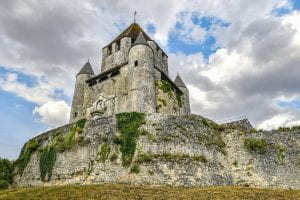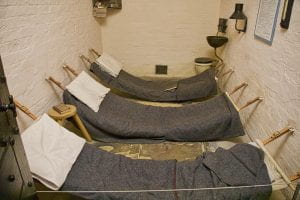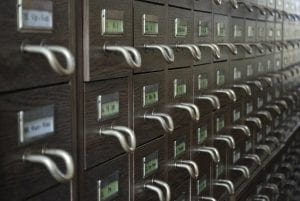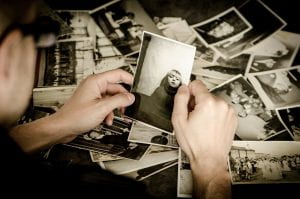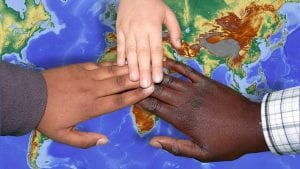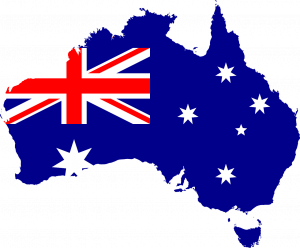
The following are the questions from the chat.
- What key records and resources do you use regularly when researching Australian ancestors?
- Have you found immigration records for all your ancestors who came to Australia? Suggest tips for finding immigration records.
- Have you found Family History or other Societies helpful with your Australian research? How did they assist with your research?
- It’s Census time! How do you overcome the fact that Australia did not keep census records (other than those very early ones)?
If you like keeping records using spreadsheets, Pauleen has a fantastic one listing hundreds of places to find information on family.
My most recommended website to start your search
CoraWeb began by an Australian genealogist prior to Google being about. A website which has links to hundreds of family history resources for both Australia and overseas.
Large Australian repositories:
National Archives of Australia – Getting started then use their guides to find out more about their collections
State archives – most archives or record offices have instructions on how to search, what collections they have and how to cite any records when using in blog posts etc
- Tasmania
- Victoria
- New South Wales
- Queensland
- Western Australia
- South Australia
- Northern Territory
- Australian Capital Territory
Australian National University – includes Pacific Research Archives and Noel Butlin Archive Centre – business and labour records
National Film and Sound Archive – including interviews, songs etc
National Library of Australia – Getting started, applying for a library card to use with e-resources
Magazine article from WDYTYA about researching Aussie heritage
Researching your Aboriginal or Torres Strait Islander heritage
State Library of Western Australia – has great family history section
Queensland Family History Society has some fantastic links
Overseas repositories with Australian records:
Ancestry – Australian collections online
FindMyPast – blog post listing some Aussie records they have, list of record sets for Australia and New Zealand
Family search – their wiki with Aussie records, list of records they have
Newspapers
Ryerson Index – death notices from papers and recently digital papers – mainly NSW
Trove – newspapers and gazettes – great for helping fill in gaps and telling stories of your ancestors but also check out other categories in Trove
Other useful websites
Find and Connect – orphanages, children’s homes and institutions
Cyndi’s List – based in USA but has a section on Aussie records
Judy Webster has links to many Australian resources
Andrew wrote about resources in New South Wales
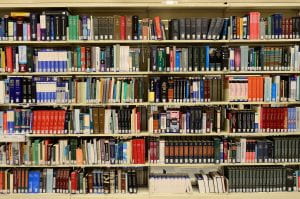
Comments from the chat regarding immigration, census and societies:
For German immigration to Australia in 19th century you must look at Jenny Paterson’s articles in Burwood FHS’s journal Ances-Tree. Combined with Kopittke indexes they’re gold.
My top tip is check passenger lists at departure AND arrival ports. I know that it’s often said that only arrival ports kept records, but this is not universal. I’ve find out outgoing passenger lists on FindMyPast & matching incoming lists for Fremantle at NAA
I agree Brooke. Depending on the years, lists for ports stopped at en route back to Oz. I also use the PROV records for inbound & outbound unassisted pax to compare it’s assisted immigration lists. Board Immigrant Lists have more detail than Agent Immigrant Lists which are what’s online.
Good tip Brooke @BrookeWooldy I found immigration records from point of departure for Scotland and with more info than we would have here
I found them on Scotlands People Brooke. They have some for those escaping the highland clearances
Land records in Victoria include a huge amount of information incl letters and personal info
I think land administration records come in useful here too….land was often granted as part of the migration package.
a lot of cemetery records have been indexed by societies, so check out the source when you’re looking at the Big Genies and see where the records came from.
I think not having census records encourages us to move beyond just one record set and learn more ways of discovering information.
I think we all just accepted that we had no census records Pauleen and when we got back to England or Scotland where they do it was a bonus!
What about the information found in Australian Wills? They can give a huge amount of information.
And sometimes property deeds eg those available on the List in Tas. I was thrilled to find a trust deed which listed all the children in birth order including my ggf for whom there is no birth/baptism record
And I was only trying to find out when he had to sell his land!
Some Wills are amazing Jennifer. But others are just plain boring unfortunately. I love the Will writers who wrote pages and pages and listed everything and everyone!
Electoral rolls are Australia’s answer to the Census. Of course its not as good as the census but beggars can’t be choosers. Post Office Directories can be very helpful too.
as frustrating as it is to have very limited availability of early census data, we have the benefit of electoral rolls which occurred more regularly and with women able to vote earlier. Also post office directories can be a help.
When I visit the reading room in Hobart Library to do research, I always ask have they got a file out the back on the family I want. Files contain replies from archivists to questions from their clients often prior to digitization.
naturalisation records can help with learning where your ancestors came from. An important difference from USA is that they only apply to non-British immigrants, so you won’t find Irish there.
Many societies are help people doing research in Australia especially when you see the records, books, index’s and loads available though I would add that the personal touch of someone that knows the resources, Australian research, etc is a fairy godmother.
societies have helped me with archives that contain other people’s research. It often has to be checked, but it contains clues.
Check for indexes on local societies where ancestors lived, read the newsletters/magazines issued by local societies
I don’t have any First Nations ancestry so all my Australian ancestors had to come from somewhere else, so my no.1 resource is shipping records: free & convict.
Remember the days when we would write to a person who had researched our family and include a self addressed envelope with a stamp? Seems so long ago now
Consider checking the crew list and not just the passenger records when looking for people.
Great tip Fran I’ve found a few on the crew list including an absconder when they arrived in Australia
I’ve had quite a lot of success with Biographical Database of Australia with my pre 1840’s arrivals – a lot more records added in recent years
Some of the early hospital records have all sorts of fascinating info like the ship they came on, who is their “next of kin” etc. Of course Murphy has his say and the one you want might not have survived.
I found a troubling statement in a Children’s Home Index, and followed up on Trove. Horrific abuse was all retold from a courtcase in the newspaper. I haven’t shared the info with many.
Sometimes it is OK to share hardship and horrible events so that we can better understand our ancestors social context and lives. You could leave out names so it is about the history and not the person. Mind you depends on what exactly happened.
Knowing about the event did help understand the person- but leaving out names wouldn’t be an option in explaining it really. I have got the info on file but am so wary of sharing it.
I can understand your reluctance to #Share. Once something is said it’s not possible to ‘unsaid’ it. Alternatively, knowing information about our #ancestors even when extremely difficult to process can help us understand our own place in the world.
I have found Family History Societies to be invaluable. I visit them whenever I am travelling to an ancestral place. Local History Societies are equally valuable resources along with libraries
Fran has mentioned that Trove also has references to people who moved across the Ditch to NZ or back. Worth the NZers looking at Trove as we should with Papers Past.
most of the State libraries have a list of suitable resources for their state such as this one in SA slsa.sa.gov.au/collections/fa…
many indexes were developed by volunteers from societies and archives. In my research I’ve always found interesting things to learn about immigration by attending classes. Listening to and learning from others is a big help. Academic books are helpful too.
military, war service;, churches attended and donations made; hospital, asylum and orphanage records; court & jail records; govt and police gazettes; petitions.
Yes don’t forget our wonderful military records. The Australian War Memorial even has battalion diaries online

I have also found local history societies great too. I have paid for some research particularly when newspapers haven’t been digitised on Trove. Local libraries often have great local history rooms too and volunteers to help.
@FamilySearch is one of the main sources I use for passenger records. Although a google search for records groups or individuals have indexed can help find some travellers.
Libraries and especially their Local Studies sections are such an important resource Alex! One I use frequently (when they are not in Lockdown)
I am interested in the answer to Q2 because I am yet to pin down immigration records for some of my husband’s Australian immigrants
Have you checked the immigration records at PROV for entry to Australia? prov.vic.gov.au
Found loads of information on Trove, NSW State Archives, Ancestry.com.au, Archives NZ and more recently the British Newspaper Archive. Also death certificate transcriptions were helpful as they often give the “years in the colony”.
My great aunt died in an asylum. There was a report in the paper. Even stranger, another woman with the same name also died in the same asylum. Difficult working out which one was which.
most of my ancestry is from England, however some distant relatives did move to Australia, after finding B/M/D records the first place I check is @TroveAustralia Trove is just so valuable esp for Family Notices and other unexpected articles
I’ve found that most of my families inquests have been reported in the newspaper so def check Trove
most of the State libraries have a list of suitable resources for their state such as this one in SA slsa.sa.gov.au/collections/fa…
Trove, Ancestry.com.au, NSW Registry of Births, Deaths and Marriages, local libraries, state libraries of QLD and NSW, NSW State Archives, British Newspaper Archive, NZ Archives, family history certificate transcribers, pers. comm. with family members
Immigration. Inquest files, Land records, Trove, Victoria birth deaths & Marriages, Linc Tasmania, Wills, PROV (Vic archives), Ancestry, FindaGrave, just to start with a few
Worth nothing that for deaths where there was an inquest, the person’s name may not have been registered in the civil death registers.
That’s interesting. For any particular state or the whole country? I was told by NSW that they did not keep the inquest documents so I was unable to research my great grand fathers brothers death in NSW via the inquest. I have the death date from announcements.
Trying to remember but I think that’s correct Fran. Each state archive can have different types of documents preserved, News stories are generally fairly reliable when it comes to legal cases.
thanks for mentioning libraries and personal communication – both very important.
Link to Libraries Tasmania, use the family history portal and also the archives portal. In each of those there are more portals to check libraries.tas.gov.au/Pages/Home.aspx
Link to Tasmanian Names Index from Tassie libraries.tas.gov.au/family-history… Click on right, put in search area name you are looking for
Tasmanian Names Index TNI includes BMD up to 1900, convict records, wills, arrivals, departures, health and welfare, some employment records
most of my immigrants were convicts or free settlers in the 1840s or thereabouts. info found on the TNI online
I was lucky to find my ancestor in an Equity Case in which the defendant referred to him by name, gave his occupation, and said they’d known each other in Bavaria.
ooh immigration records – yes quite a few. Mostly in Queensland through State Archives. My father did very well finding some down in Victoria too. From memory convict records or death certificates might record the ship they came out on. Gravestones too.
I have found all but 1. George Kunkel was a swimmer it seems. Immigration records NSW and Qld, PROV immig for comparison, Immig Deposit Journals (IDJs), Board lists show more detail. Disposal lists, Trove and diaries for the journey.
I discovered a great aunt had died on the Ryerson Index. No one had told me!
Ryerson is fabulous for pinning down those who’ve died in more recent years! And then the notices themselves will give descendants and married names for daughters.
I use electoral rolls, immigration records, directories, church archives, convict records, newspapers, telephone books among others. Some I find online and others are at archives and libraries
Readers: What are some of your favourite Australian sites to use for research?






